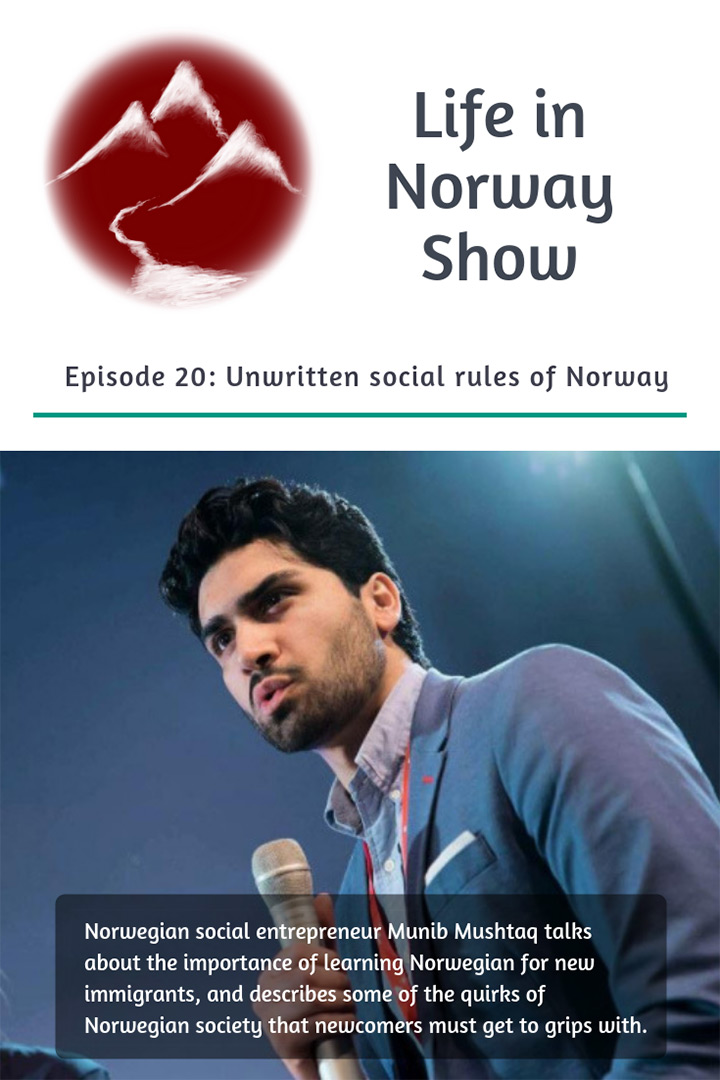
Life in Norway Show Episode 20: Social entrepreneur Munib Mushtaq talks about working with immigrants and the unwritten social rules of Norwegian society.
There are many organisations that help people moving to Norway, but few courses look beyond the practicalities of setting someone up in the system, learning the language and finding employment.
While all those things are important, becoming truly settled in Norway with Norwegian friends and a full active social life is perhaps the biggest challenge of all. Institutions don’t teach the Norwegian social code and new refugees and immigrants often have to learn the hard way.
Today we meet Munib Mushtaq, a Norwegian social entrepreneur and founder of Gi en Hånd, who is on a mission to change that! He was born in Norway to immigrant parents, so has personal experience in adapting to different cultures.
Listen to the show
You can listen to the show using the web player below, or on your podcast player of choice, including: Apple Podcasts, Stitcher, YouTube (audio only), and now Spotify. Simply search for ‘life in Norway' on your platform of choice to get started.
Wherever you listen, don't forget to hit ‘subscribe' to ensure you don't miss an episode!
A helping hand for new arrivals
Gi en Hånd is a voluntary organisation with the main goal of building bridges and integrating minority groups to create a stronger generation to strengthen Norway as a nation. Their specialisation is providing intensive Norwegian courses that take just one month per level, which is much faster than standard courses.
“The standard courses are just too slow for a lot of people who are coming to Norway with good, educated backgrounds who want to find a job. We want to help those people integrate fast”, explains Munib.

The organisation grew quickly, and in just six months could claim four board members, 60+ teachers, 300+ volunteers, and over 1,000 students in four major cities in Norway. Today, Gi en Hånd is now active in 11 towns and cities across the country.
Social rules in Norwegian society
On the language courses, Gi en Hånd also teach a lot about Norwegian society. “If you are planning to Norway the first thing to get your head around is greetings. You don't greet people randomly, or even for example when getting to work. We only greet when you have a specific purpose for doing so”, says Munib. Interactions can take a lot of getting used to. “Norwegians like to be alone. They sit alone, they eat alone, they commute to work alone.”
Another important part of Norwegian society that Munib says is really important to understand and join in on is the dugnad, a volunteer event run by local sports clubs, associations and housing estates. “If you get asked to join just say yes and do it, so then maybe you have a chance to interact with your neighbours!”, he says.
David also mentions some of his most popular articles on Life in Norway that are related to behaviour, such as janteloven and whether Norwegians are rude or simply trying to be polite.
Social entrepreneurship in Norway
Munib started with a mission to help refugees that came to his small town, Halden. “I thought that if I can help them on my spare time, I would be really happy to do that. We did something right, because it quickly grew”, he says.
Munib explains that there are a lot of opportunities for getting started with a social enterprise in Norway, even though entrepreneurship as a whole is relatively new to Norway. “Norway asa country is really helpful to social entrepreneurs because we are trying to do something good for society. There are opportunities to get funding and people who are ready to support your cause”, he says.
Links from the show
If you are interested in finding out more about the topics discussed on today's show, here are some helpful links:
- Munib's organisation: Gi en Hånd
- The book: How to Find a Job in Norway
- Norway's mysterious social code: What Exactly is Janteloven?
- Understanding Norwegian behaviour: Are Norwegians Rude?
- Standard Norwegian courses: Språk Akademiet
- Norwegian for health workers: Helse Norsk
- Norwegian for Au pairs: Au Pair Norsk


